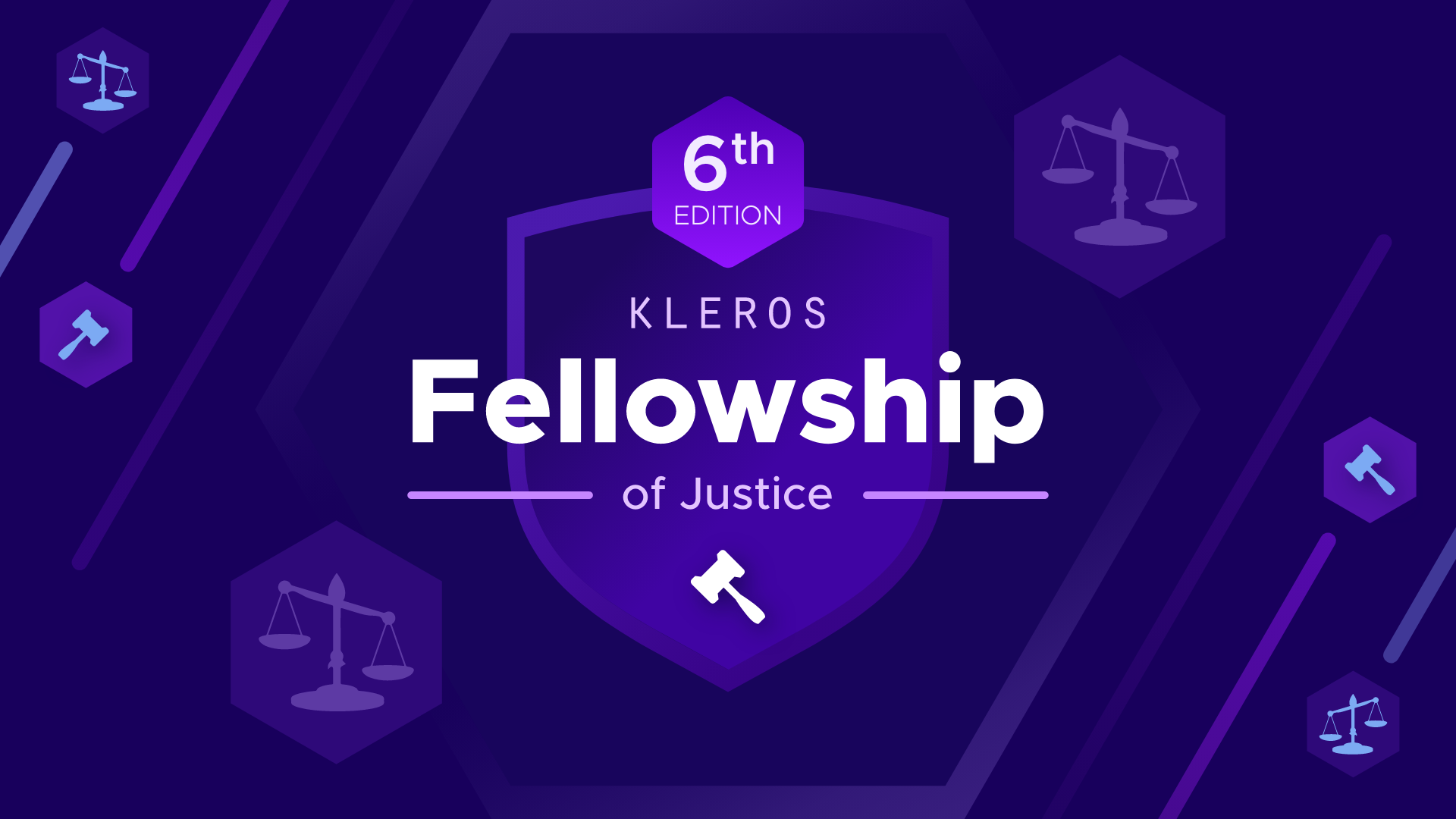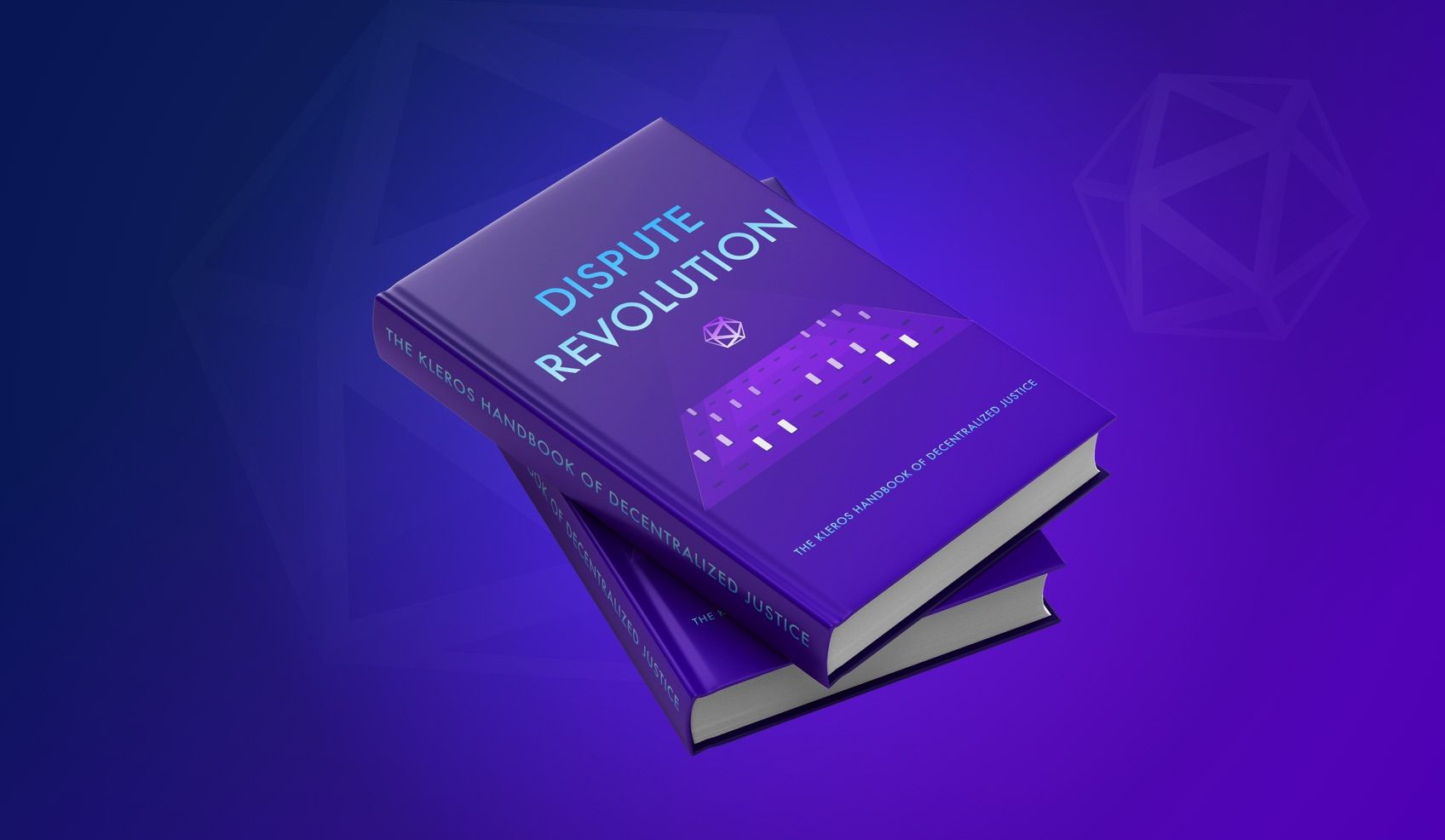The Kleros Fellowship of Justice, 6th Generation: Applications Open!

Apply now and help build the future of decentralized justice!
In August of 2018, we launched the Kleros Fellowship of Justice with the goal of creating a strong community of experts in the emerging field of decentralized justice.
In this six month-long program, participants from the fields of computer science, cryptoeconomics, law and business collaborate with core members of the Kleros team in conducting doing some type of work relevant to the advancement of decentralized justice.
Some of the topics addressed by Fellows from previous cohorts include:
- Kleros: A Socio-Legal Case Study Of Decentralized Justice & Blockchain Arbitration by Luis Bergolla.
- Incorporating Kleros in long-term energy supply contracts by Abeer Sharma.
- Interactions between decentralized justice and artificial intelligence by Alexei Gudkov.
- Applying Kleros to civil courts in cases of liability derived from parental responsibility by Julieta Fernández Tineo.
- Kleros for labor certification in the blockchain by Elliot Talbert-Goldstein.
- Dispute resolution in p2p renewable energy markets by Mauricio Duarte.
- Kleros for copyright disputes in digital environments by Paolo Archila.
On this page, you can access the research produced by participants of the previous editions of the program. Check this post with a number of testimonials from previous participants.
In this new cohort, the Fellowship includes a number of grants for specific lines of research in content moderation, decentralized law ecosystem development, policy drafting, DAO bankruptcy court, insurance, escrow, governance, cryptoeconomics and society tracks.
Candidates will be accepted into each of these tracks based on the quality of their proposal. $1,000 in PNK will be paid to candidates upon the successful completion of the program.
Application deadline: August 15th, 2022.
Content Moderation Track
The goal of this track is to research applications of decentralized justice in connection to content moderation in social media and other types of media.
This includes research about better cryptoeconomic designs for such systems and the study of new use cases for decentralized content moderation for account suspensions, deletion of material and fake news/trusted source alerts, among others.
Decentralized Law Ecosystem Development Track
As disputes in decentralized justice develop in caseload, a burgeoning number of users will be attracted to specific roles in the Kleros courts ecosystem, be they jurors, expert witnesses, or lawyers. Furthermore, as disputes become more sophisticated, users will conclude the need for specific expertise in certain niches such as disputes relating to DAO governance or e-commerce transactions.
Fulfilling these needs for beginner onboarding or the development of expertise will require an education system relevant to the structure of Kleros, much like traditional legal systems have law schools and continuing professional development programs.
The goal of this track is to produce materials and teaching methods to foster the creation of a decentralized legal professional community.

Policy Drafting Track
The goal of this track is to improve the drafting of policies used in Kleros courts from a mixture of legal and behavioral economic perspectives. Effective policy writing should both consider what policies provide a robust framework, as well as the user psychology of how these policies are likely to be interpreted by the community of users and lead to the creation of Schelling points.
Research in the policy track may touch upon several issues pertinent to court policy, such as analyzing how jurors have interpreted past policies, soliciting feedback on how jurors may interpret alternative policies, or investigating and designing juror qualification criteria for subcourts that require specific subject-matter expertise or geographic presence.
Bankruptcy Court Track
Just like traditional institutions, DAOs may face the risk of going bankrupt and leaving their debtors and investors with complex, conflicting claims on a substantially decreased asset base. Centralized institutions are subject to an intricate procedure involving receivership and debtor hierarchies to determine the financial payouts due to various claimants. These procedures may not be effectively applicable to DAOs
The goal of this track is to investigate and develop tools and procedures to prevent and address DAO insolvency in a decentralized manner, with Kleros at the heart of the process.
Escrow Track
The purpose of an escrow is on paper a simple one: to operate as a trusted impartial entity that will serve as a repository of funds or other assets and release them in accordance with the terms of the agreement between the transacting parties.
Escrows are commonly used in a range of transactions ranging from real estate purchases to IP licensing. However, existing escrow mechanisms are typically centralized with too much discretion concentrated into the hands of a few individuals with their own vested interests.
The purpose of this track is to identify and develop use cases where Kleros can operate as an effective escrow mechanism in transactions where parties may benefit from an impartial, decentralized layer of security over funds, assets, and other instruments or securities.
Insurance Track
The explosion of the DeFi ecosystem has witnessed an expanding number of services and protocols claiming to provide decentralized insurance.
However, these decentralized insurance services operate in a void of confusion and uncertainty, thereby limiting their attractiveness for widespread adoption among DeFi users. The traditional insurance industry has evolved over centuries to avoid some of the common pitfalls of operating in such a risky area, such as by adopting minimum liquidity ratios, standardized interpretation and contracting practices, and dispute resolution procedures.
The purpose of this track is to ascertain and develop use cases for Kleros to integrate with the DeFi insurance ecosystem, including adopting functions like operating as an oracle to ascertain whether a specific insured event has occurred or to interpret DeFi insurance terms within the complex technical and crypto-economic environment in which they operate. The track would also be relevant for those with expertise in the insurance industry to contribute to DeFi insurance policymaking.
To learn more about Kleros in decentralized insurance, read this post.
Governance Track
The goal of this track is to research the improvement of DAO governance mechanisms through the use of an open and fair arbitration court.
This includes the demonstration of the benefits of optimistic governance schemes (delegate executive power but allow for retroactive penalties or veto power in case of dispute), compute the economic power required to attack the legislative branch of a DAO versus the judiciary branch securing it or design novel ways of integrating arbitration in DAO to DAO collaboration.
Cryptoeconomics Track
The goal of this track is to research potential improvements to the Kleros protocol or cryptoeconomic effects that one could expect from the protocol as it exists.
An example of particularly relevant research would include reflections on novel schemas that could be integrated into the Kleros protocol that make use of zero-knowledge proof tools that offer advantages such as enhanced user privacy and confidential voting.
Further relevant research could consider how soulbound tokens can be integrated into the Kleros protocol to allow for juror selection that takes into account jurors’ credentials, and how such social layer may interact with the existing crypto-economic mechanisms. Also relevant work would be to investigate and understand how artificial intelligence development will interact with Kleros.
To learn more about research challenges in cryptoeconomics, read Kleros’s Yellow Paper.
Society Track
Applicants for this track would be expected to research the ideas of how Kleros might be practically useful to solve socially important problems. It could cover any field where the use of Kleros might be useful to facilitate the positive transformation of the social order in the communities by making adjustments and variations to social institutions, behaviour, and relations.
Applicants are free to choose their topic that corresponds to modern social issues: access to justice, environmental issues, information security, education, corporate accountability, unemployment, diversity, inclusion, etc.
The research may be focused on both case studies and the theoretic approach. The candidates ideally would have some background in social studies and liberal arts, however, everyone with a profound interest in societal change is encouraged to apply.
Community Track
This track will focus on the needs of the dynamic, growing Kleros community. The work of the concerned Fellows may include devising processes for ensuring effective community management of Kleros users and stakeholders across all Kleros-affiliated platforms, developing tools to maximize community participation and satisfaction, and proposing mechanisms to maximize accountability and encourage productive feedback.
Want to apply but your interest doesn't fall in any of these categories?
The Fellowship also accepts candidates from other lines of research in law, business and computer science. While these other tracks are not funded, you will still count on the support of the Kleros team for guidance.
The application process is open for the sixth edition.



